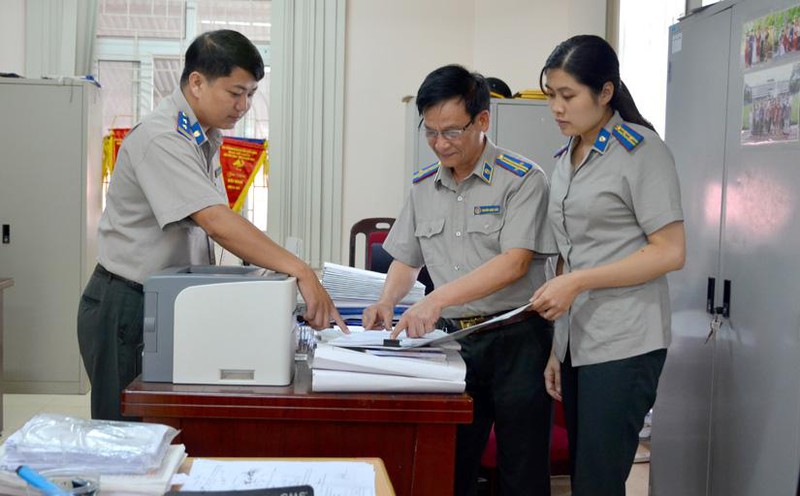Criteria for appointment of enforcers in Vietnam
Who is enforcer? What are the criteria for appointment of enforcers in Vietnam? – Ha Phuong (Ha Tinh)

Criteria for appointment of enforcers in Vietnam (Internet image)
Regarding this issue, LawNet would like to answer as follows:
1. Who is an enforcer?
- Enforcers are persons tasked by the State to enforce judgments and rulings prescribed in Article 2 f the Law on Enforcement of Civil Judgments 2008.
Enforcers have three ranks: junior enforcer, intermediate-level enforcer and senior enforcer.
- Enforcers shall be appointed by the Justice Minister.
(Article 17 of the Law on Enforcement of Civil Judgments 2008)
2. Criteria for appointment of enforcers in Vietnam
- Vietnamese citizens who are loyal to the Fatherland, honest, non-corruptible, possess good ethical quality and a law bachelor or higher degree, and have good health to fulfill assigned tasks may be appointed as enforcers.
- Persons who fully satisfy the criteria specified in Clause 1 of Article 18 of the Law on Enforcement of Civil Judgments 2008, and the following conditions may be appointed as junior enforcers:
+ Having been engaged in legal work for 3 years or more;
+ Having been trained in civil judgment enforcement profession;
+ Passing the examination for selection of junior enforcers.
- Persons who fully satisfy the criteria specified in Clause 1 of Article 18 of the Law on Enforcement of Civil Judgments 2008, and the following conditions may be appointed as intermediate-level enforcers:
+ Having worked as junior enforcers for 5 years or more;
+ Passing the examination for selection of intermediate-level enforcers.
- Persons who fully satisfy the criteria specified in Clause 1 of Article 18 of the Law on Enforcement of Civil Judgments 2008, and the following conditions may be appointed as senior enforcers:
+ Having worked as intermediate-level enforcers for 5 years or more;
+ Passing the examination for selection of senior enforcers.
- Persons who fully satisfy the criteria specified in Clause 2 of Article 18 of the Law on Enforcement of Civil Judgments 2008 and are army officers in active service may be appointed as military enforcers.
Criteria for persons to be appointed as military junior enforcers, intermediate-level enforcers and senior enforcers are as specified in Clauses 2, 3 and 4 of Article 18 of the Law on Enforcement of Civil Judgments 2008.
- Incumbent judges, procurators and investigators who are transferred to civil judgment enforcement agencies may be appointed as enforcers of equivalent ranks without having to take examination.
- In special cases specified by the Government, persons who fully satisfy the criteria specified in Clause 1 of Article 18 of the Law on Enforcement of Civil Judgments 2008 and have been engaged in legal work for 10 years or more or 15 years or more may be appointed as intermediate-level or senior enforcers, respectively.
(Article 18 of the Law on Enforcement of Civil Judgments 2008)
3. Tasks and powers of enforcers in Vietnam
Tasks and powers of enforcers include:
- To promptly organize the enforcement of judgments or rulings assigned to them; to issue judgment enforcement decisions according to their competence.
- To strictly enforce contents of judgments or rulings; to correctly apply legal provisions on the order of and procedures for judgment enforcement, ensuring the interests of the State and the rights and legitimate interests of involved parties and persons with related interests and obligations; and to strictly observe regulations on standard professional ethics of enforcers.
- To summon involved parties and persons with related interests and obligations for judgment enforcement.
- To verify assets and judgment execution conditions of judgment debtors; to request concerned agencies, organizations and individuals to supply documents for the verification of addresses and assets of judgment debtors or coordinate with concerned agencies in handling material evidence, assets and other matters related to judgment enforcement.
- To decide on the application of measures to secure judgment enforcement and coercive measures to enforce judgments; to work out plans on coercive judgment enforcement; and to confiscate assets for judgment enforcement.
- To request under law police offices to detain persons resisting the judgment enforcement.
- To make written records of violations of the law on judgment enforcement; to impose administrative sanctions according to their competence; to propose competent agencies to discipline or administratively sanction violators or examine violators for penal liability.
- To decide on the application of coercive measures to recover money and assets already paid to involved parties in contravention of law, collect judgment enforcement charges and other amounts payable by involved parties.
- To use support tools while on duty under the Governments regulations.
- To perform other tasks assigned by heads of judgment enforcement agencies.
When performing their tasks or exercising their powers, enforcers shall comply with law and take responsibility before law for judgment enforcement and have their lives, health, honor, dignity and prestige protected by law.
(Article 20 of the Law on Enforcement of Civil Judgments 2008)
- Key word:
- enforcer
- in Vietnam
- Penalties for fraudulent activities on e-commerce platforms in Vietnam
- Guidance on issuing driver licenses for individuals with expired driver licenses in Vietnam
- Cases of verification of driver licenses in Vietnam according to Circular 35
- Proposal on night shift allowance policies and meal support for healthcare employees in Vietnam
- What is Pi Network? Is Pi Network legal in Vietnam?
- Proposal to lower health insurance contribution rates to alleviate economic burden on citizens in Vietnam
-

- Emergency response and search and rescue organizations ...
- 10:29, 11/09/2024
-

- Handling of the acceptance results of ministerial ...
- 09:30, 11/09/2024
-

- Guidance on unexploded ordnance investigation ...
- 18:30, 09/09/2024
-

- Sources of the National database on construction ...
- 16:37, 09/09/2024
-

- General regulations on the implementation of administrative ...
- 11:30, 09/09/2024
-

- Guidelines for maintenance and renovation of villas ...
- 14:30, 21/02/2025
-

- Guidelines for maintenance and renovation of villas ...
- 14:30, 21/02/2025
-

- Procedures for high school admission in Vietnam
- 14:25, 21/02/2025
-

- Resolution 190: Principles for addressing certain ...
- 11:30, 21/02/2025
-

- Guidance on identifying cases of inaccurate or ...
- 11:00, 21/02/2025

 Article table of contents
Article table of contents
